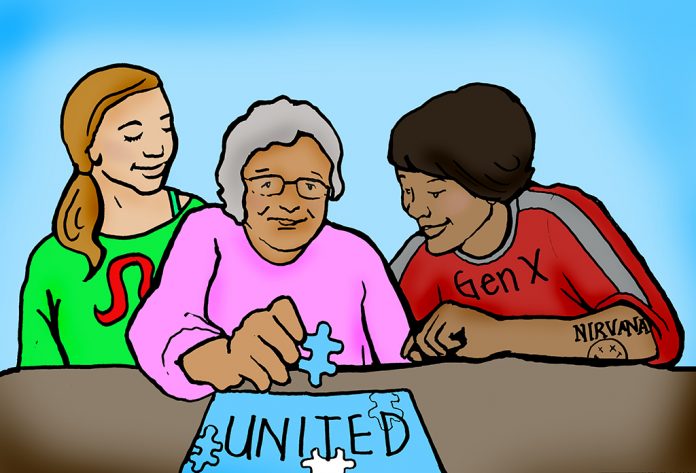Stereotypes are broad generalizations of groups of people based on traits they may or may not have control over. A common one you might have encountered is age. I’m not just talking about the tired fights over music or art, I’m referring instead to the sweeping statements that all the youth today are sensitive, smoothie-drinking hippies in yoga pants, or that all elderly folks are judgmental, stingy conservatives with walkers. These kinds of stereotypes, despite being preposterous, cause friction and division within our society.
In order for our society to function more productively, generations must learn from each other and work cohesively. There must be a balance between fresh ideas and wisdom, between change and stability. There’s a web of misinformed speculation that is blocking the path to clear communication. So let me break down that wall and clarify a few things.
Post World War II saw a boom in births between 1946 and 1964. This generation is called “baby boomers,” and these are the folks that, in 2016, are between 52 and 70 years old. Baby boomers are the tough people that grew up during the Korean and Vietnam Wars and survived polio, but they also had The Beatles and Jaguar XK120 so it wasn’t all bad. Younger generations see baby boomers as less self-aware and more traditional, yet also greatly admire and respect how hardworking and dedicated to their children baby boomers are. They are also seen as pioneers that paved the way for the freedoms and rights that we enjoy today.
Moving on to the next generation, born between 1965 and 1979, is Generation X. This makes them 37 to 51 years old today. This is the amazing generation that got to witness man venturing into space, the disco era, and ***The Godfather. But this generation is most known for the change in how people thought. Protesting and activism became the norm. People were no longer OK with sitting by and accepting the status quo. They were rebels who fought to change laws and earn equal rights that made generations today able to enjoy more freedoms and inclusivity than ever before.
Millennials tend to recognize the importance of steps the activist baby boomers of the time and their Gen X children made. Gen X taught them how to challenge static thinking, something they are very appreciative for, and provided them with many luxuries and advancements.
Again, this is contrary to how the older generation thought the younger generation perceived them. Gen X often thinks that millennials see them as less educated, not as tech savvy, nor open-minded. Surprisingly, the younger generation often reports not always knowing more about technology than their parents. I suppose we all are lost with the amount of updates constantly being thrown at us. Technology is moving so fast even the kids raised on it can’t keep up!
Which brings us to our final generation, the “millennials,” or Generation Y. Nope, the Y does not stand for yoga pants. It represents the people born between 1980 and 1994, who are now 22 to 36 years old. The assumption is that the older generations see millennials as lazy, incompetent, and financially irresponsible. Our love affair with technology and sharing our personal lives also sometimes earns us the nickname “Generation Me.” The older generations view millennials as more environmentally conscience, tech savvy, and resourceful. In fact, baby boomers and Gen X-ers both acknowledge that Generation Y is more socially accepting of diversity and more creative at finding jobs that are sustainable in this economy.
So you see how important it is for us to open communication between the generations. Without conversation, how are the baby boomers able to express what they need to be supported in retirement, or Gen Y able to express that more jobs are needed for them to survive? Each generation thinks the other generations perceives them in a negative light when really there is a lot of positivity. The mutual respect is already there, it’s just not being expressed. Communication could break through the stereotypes and help us realize that each generation has something to contribute.
We’re going to have to work together if we want this planet to sustain the next generations. It is my hope that we learn to do this now to be better equipped to guide Generation Z when they come of age. Maybe by then we’ll be known as the Generation YOU: Young and Old United.


